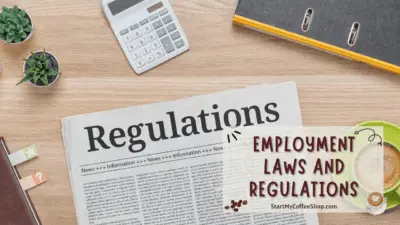Opening a coffee shop can be an exciting and fulfilling venture. However, before embarking on this journey, it’s crucial to understand the legal requirements and considerations involved. From permits and licenses to health and safety regulations, complying with the law is essential for an effective and legally sound operation.
When opening a coffee shop, ensure legal compliance by registering your business, obtaining permits and licenses, following health and safety regulations, understanding employment laws, protecting intellectual property, and complying with lease agreements and zoning regulations. Seek professional advice if needed.
In this article, I will explore the key legal aspects to consider when opening a coffee shop, providing you with valuable insights to navigate the process confidently.
Business Structure and Registration
When opening a coffee shop, choosing the right business structure is a crucial initial step. Several options are available, including sole proprietorship, partnership, limited liability company (LLC), and corporation. Each structure carries legal implications that can impact various aspects of your coffee shop’s operations.

A sole proprietorship is the simplest structure, where you are the sole owner and responsible for all aspects of the business. Partnerships involve two or more individuals sharing ownership, responsibilities, and liabilities. LLCs provide personal liability protection for owners, known as members while offering flexibility in management and taxation. Corporations, on the other hand, are separate legal entities from their owners, offering strong liability protection but involving more complex formalities.
Once you have determined the most suitable business structure, the next step is to register your coffee shop with the appropriate government agencies. This typically includes obtaining a business license, which grants you the legal authority to operate. Additionally, you will need to register for taxes, such as applying for an Employer Identification Number (EIN) from the Internal Revenue Service (IRS) and fulfilling any specific local requirements mandated by your jurisdiction.
Registering your business ensures compliance with legal regulations and allows you to operate within the bounds of the law. It also provides credibility and protection for your coffee shop, allowing you to engage in transactions, hire employees, and establish contracts.
To register your business, you may need to provide relevant documentation, such as identification, proof of address, and business details. The specific requirements vary depending on your location, so it’s essential to research and follow the guidelines provided by the relevant government agencies.
Read more about: How to Create a Coffee Shop Business Plan: From Concept to Cappuccino
Permits and Licenses
Operating a coffee shop entails obtaining several permits and licenses to ensure legal compliance. The specific requirements for these permits and licenses vary depending on your location, so thorough research and adherence to local regulations are crucial.
One of the primary permits you’ll need is a general business license, which grants you the legal authorization to operate your coffee shop. This license demonstrates that you meet the basic requirements set by the local government. Additionally, a food service license is typically required to ensure that you comply with health and safety regulations when handling and serving food and beverages.
If you plan to serve alcoholic beverages, you will likely need a liquor license. Obtaining a liquor license involves fulfilling specific criteria, such as age restrictions, training certifications, and compliance with alcohol-related regulations. The application process for a liquor license can be more extensive and time-consuming, so it’s essential to start the process well in advance.
Depending on your location, you may also need additional permits related to building occupancy, signage, outdoor seating, and health inspections. Building occupancy permits to ensure that your coffee shop complies with local fire safety codes and can accommodate the expected number of customers. Signage permits regulate the placement, size, and design of signs for your business. If you plan to have outdoor seating, you may need a permit that specifies the number of tables, chairs, and the designated area.
Health inspections are another critical aspect of operating a coffee shop. Local health departments conduct inspections to ensure that you maintain proper hygiene, food handling practices, and sanitation protocols. Obtaining the necessary certifications, such as a food handler’s permit, may be required as part of the health inspection process.
To streamline the permit and licensing process, engaging with the relevant authorities early in the planning phase is advisable. Research the specific requirements for your location, contact the appropriate government agencies, and seek guidance on the application procedures. Doing so can ensure a smooth and efficient process, avoiding potential delays or penalties that may arise from non-compliance.
Health and Safety Regulations
Ensuring a safe and hygienic environment is of utmost importance when operating a coffee shop. Compliance with health and safety regulations is not only a legal obligation but also essential for customer satisfaction and trust in your establishment. To achieve this, it is crucial to follow proper guidelines for food handling, storage, and preparation, as well as maintain cleanliness and sanitation practices.
Familiarizing yourself with the specific health department requirements in your locality is essential. These requirements outline the necessary protocols for food safety, including temperature control, proper storage of ingredients, and appropriate handling procedures. It is advisable to review and understand these regulations thoroughly to ensure compliance.
Obtaining any necessary certifications, such as a food handler’s permit, demonstrates your commitment to upholding the highest standards of food safety. This certification typically involves completing a training program that covers topics like safe food handling, hygiene practices, and potential hazards. By ensuring that your employees also possess the required certifications, you can maintain a knowledgeable and well-trained staff, further enhancing food safety practices within your coffee shop.
Implementing a comprehensive food safety plan is essential. This plan should encompass various aspects, including proper cleaning and sanitation procedures, regular maintenance of equipment, and guidelines for personal hygiene. Clearly outlining these protocols and ensuring that all staff members are trained on them will help establish a culture of food safety within your establishment.
Regular inspections are crucial to identify any potential risks or areas that require improvement. Conducting internal inspections and audits, as well as inviting health department inspections, will help you identify and address any issues promptly. These inspections provide opportunities to make necessary adjustments, maintain compliance, and continuously improve your coffee shop’s overall safety and hygiene standards.
Employment Laws and Regulations

When hiring employees for your coffee shop, it is vital to prioritize compliance with employment laws and regulations. This entails understanding and adhering to minimum wage requirements, overtime rules, and proper worker classification, distinguishing between employees and independent contractors.
Familiarizing yourself with fair employment practices, anti-discrimination laws, and health and safety regulations related to workers is essential. Establishing comprehensive employment contracts, maintaining accurate records, and ensuring your payroll procedures comply with tax withholding and reporting obligations are integral to maintaining legal compliance in your coffee shop’s workforce management.
By staying informed and following these guidelines, you can create a fair and harmonious work environment while meeting your legal obligations as an employer.
Read more about: How to Create a Business Plan for Coffee Shops: A Cappuccino Capital
Intellectual Property Considerations
Safeguarding your coffee shop’s brand identity is paramount for establishing a distinct presence in a competitive market. To protect your brand, it is advisable to register trademarks for your business name, logo, and any unique products or services you offer. This legal safeguard protects third parties from utilizing comparable marks that can mislead customers or damage the reputation of your brand. Before finalizing your trademarks, conduct a comprehensive search to ensure that your chosen name or logo does not infringe upon existing trademarks.
In addition to trademarks, if you plan to create original content for your coffee shop, such as a website, blog, or social media presence, it is crucial to familiarize yourself with copyright laws. Copyright protects original works of authorship, including written content, images, videos, and other creative materials. Ensure that you have the necessary rights or permissions to use any copyrighted content and properly attribute any intellectual property that belongs to others.
By proactively registering trademarks and respecting copyright laws, you can safeguard your coffee shop’s unique brand identity and creative assets. This protection not only helps distinguish your business from competitors but also strengthens customer recognition and loyalty.
Consulting with intellectual property professionals or attorneys specializing in trademark and copyright law can provide valuable guidance tailored to your specific needs and circumstances, ensuring comprehensive protection for your coffee shop’s brand identity.
Lease Agreements and Zoning Regulations
Finding the perfect location for your coffee shop involves not only the physical aspects but also considerations of lease agreements and zoning regulations. When entering into a lease agreement, it is crucial to review the terms carefully and negotiate when necessary to protect your interests.
Key factors to consider include rent, lease duration, renewal options, and any restrictions on alterations or subleasing. Ensuring clarity and alignment on these terms will provide a solid foundation for your coffee shop’s operations.
In addition to lease agreements, it is essential to understand and comply with zoning regulations. Zoning regulations dictate where commercial businesses, such as coffee shops, can operate within a given area. Ensure that the location you have chosen is properly zoned for your intended business.
Consulting local zoning ordinances will help you determine if your coffee shop is permitted in that specific area. If needed, obtain any necessary permits or variances to ensure compliance with zoning regulations. By doing so, you can avoid potential legal complications that may arise from operating a business in a location that is not properly zoned.
Navigating lease agreements and zoning regulations may require professional assistance. Seeking advice from real estate agents, attorneys, or business consultants who specialize in these areas can provide valuable guidance and help you navigate the legal aspects smoothly. Their expertise can ensure that you understand the terms and obligations involved in lease agreements and that you comply with zoning regulations, setting your coffee shop up for popularity in its chosen location.
Summary
With careful planning, attention to detail, and a commitment to legal compliance, you can confidently open a coffee shop that not only satisfies the cravings of coffee lovers but also meets all the legal requirements to operate smoothly and responsibly. Best of luck on your journey to becoming an awesome coffee shop owner!
Frequently Asked Questions

1. What permits and licenses are required to open a coffee shop?
To open a coffee shop, you typically need a general business license, a food service license, and potentially a liquor license if you plan to serve alcohol. Additional permits may be necessary for outdoor seating, signage, and health inspections, depending on your location.
2. What health and safety regulations should I be aware of when opening a coffee shop?
Maintaining a safe and hygienic environment is crucial. Familiarize yourself with food handling, storage, and preparation guidelines. Follow cleanliness and sanitation practices. Obtain necessary certifications such as a food handler’s permit and implement a comprehensive food safety plan.
3. What employment laws should I consider when hiring staff for my coffee shop?
Ensure compliance with minimum wage laws, overtime rules, and fair employment practices. Understand worker classification (employee vs. independent contractor) and adhere to anti-discrimination laws. Establish proper employment contracts and fulfill tax withholding and reporting obligations.
To learn more on how to start your own coffee shop, check out my startup documents here.
Disclaimer: The information provided by StartMyCoffeeShop.com (“The Site”) is for general informational purposes only. All information on the Site is provided in good faith. However, we make no representation or warranty of any kind, express or implied, regarding the accuracy, adequacy, validity, reliability, availability, or completeness of any information on the Site. Under no circumstance shall we have any liability to you for any loss or damage of any kind incurred as a result of the use of the Site or Reliance on any information provided on the Site. Your use of the Site and reliance on any information on the Site is solely at your own risk. This blog post is for educational purposes only and does not constitute legal advice. Please consult a legal expert to address your specific needs. Terms and Conditions. (https://startmycoffeeshop.com/terms-and-conditions/)

Hi! I’m Shawn Chun
My adventure in coffee began when I first launched my first coffee shop back in the early 2000s. I had to figure out so many things on my own and to make it worse within 2 years of opening two large corporate coffee chains moved in just blocks away from me!
As I saw smaller and even some larger coffee shops in the neighborhood slowly lose customers to these giant coffee chains and slowly close up shop, I knew that I had to start getting creative…or go out of business.
I (like you may be) knew the coffee industry well. I could make the best latte art around and the foam on my caps was the fluffiest you have ever seen. I even had the best state-of-the-art 2 group digital Nuova Simonelli machine money could buy. But I knew that these things alone would not be enough to lure customers away from the name brand established coffee shops.
Eventually, through lots of trial and error as well as perseverance and creativity I did find a way to not only survive but also thrive in the coffee/espresso industry even while those corporate coffee chains stayed put. During those years I learned to adapt and always faced new challenges. It was not always easy, however, in the end, I was the sole survivor independent coffee shop within a 10-mile radius of my location. Just two corporate coffee chains and I were left after that year. All told the corporate coffee chains took down over 15 small independent coffee shops and kiosks and I was the last one standing and thriving.
Along the years I meet others with the same passion for coffee and I quickly learned that it is not only “how good a barista is” that makes a coffee shop successful, but the business side of coffee as well.
Hence why I started this website you are on now. To provide the tools and resources for up and coming coffee shop owners to gain that vital insight and knowledge on how to start a coffee shop successfully.
Stick around, browse through my helpful blog and resources and enjoy your stay! With lots of LATTE LOVE!
Shawn







